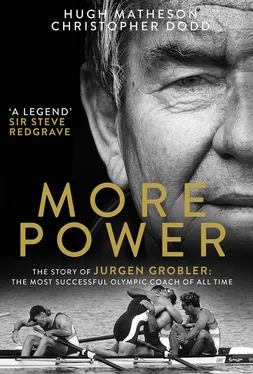Grobler was brought up in Magdeburg, East Germany, studied at the hothouse of sporting achievement, Leipzig University, and produced Olympic golds in three Games for the country until the Berlin Wall collapsed in 1989, thawing the Cold War and leading to a new, united Germany. His forty-year Olympic career compares with no other in the history of sport.
From Munich when he was 26 to Rio when he was 70, his athletes have gathered medals on the podium while he has stood nearby with joy and fulfilment on his face. But behind the tears in his eyes, his next campaign is beginning to take shape.
For the few engaged in full-time sport to the millions who watch and dream, the prize-giving and medal-kissing rituals – ceremonies with oldies in blazers and the winners swollen with muscular pride – are as glamorous as anything offered in life. Those peaks are reached only by doing a life term in grim physical exhaustion inspired solely by fear of failure. That’s where Jurgen has lived six days a week for fifty years since the very beginning of his life in rowing at the German College of Physical Culture in Leipzig when he was preparing to climb the podium. Fifteen thousand days, perhaps, of anxiety and expertise, of working through simple solutions to complex problems, always alert for weakness in his athletes and in himself.
His job has offered extreme stress every day since he left school, and the matrix of his economic, political and social life has been as crisis-ridden as anyone’s who has avoided living through a war. When he signed on to become a rowing coach in East Germany, it was an elite profession in a country which had chosen sport as its means of expression to avoid admitting that it was an expendable buffer of the Soviet Union, which in turn was suffering a bad reaction to the strain of its own contradictions.
He was one in a population of fifteen million, many of whom thought the grass was greener on the other side of the concrete wall that had been built ‘for the protection’ of the people, but where they were shot if they did not agree that they were happier where they were.
Countries like East Germany have always depended on State Security and on police, sometimes secret, sometimes public, but always brutal. Every citizen, Jurgen not excepted, has to determine the degree of collaboration he will offer to live the life that suits him and his family. There is discretion in each person’s decision: you can choose to help the state and thrive, or you can offer less and get back much less. No one could treat the GDR with lofty humour and get away with it. Even the elites of the communist party, the SED – the equivalents of Eton, Oxford and a Tory cabinet in Britain – could not crack a joke and survive.
When the GDR suddenly fell apart in 1989, choices had to be made and opportunities grasped. Jurgen brought his family to live in Henley-on-Thames when he was hired to coach the world’s best oarsmen of the time, Steve Redgrave and Matt Pinsent. By fate, luck or design, he exchanged the world’s richest but now defunct rowing country for one destined – with his significant help – to rise to the top of the performance table.
This is his story.
1
1972
The Munich Olympiad
‘Grobler understood that collaboration with the other key elements would bring the results the state required.’
– KLAUS FILTER
Three-quarters of the way through the final of the single-sculls event at the Munich Olympics in 1972, German political and sporting history was poised on the needle of a stopwatch. West German Udo Hild was holding bronze-medal place by 0.02 of a second ahead of the young, blond East German, Wolfgang Güldenpfennig. At the 1500-metre mark, with 500 metres of the 2000-metre course left to decide, the question was not only which German was the faster sculler, but also which half of the nation had chosen the right path to prosperity and prestige from the ruins of the Second World War. As it happened, Güldenpfennig, the scion of Magdeburg, powered on to take third place by nearly four seconds from the fading Hild.
This result was vindication for a training programme designed not only to place the Magdeburger ahead of the West German, but to put East Germany, at worst, third on the Olympic medal table behind the United States, the world’s richest nation with a population of 210 million, and the Soviet Union with 260 million people. East Germany at the time had sixteen million and a wealth ranking at least twenty years behind its western neighbour.
Güldenpfennig’s trainer was Jürgen Grobler, a 26-year-old assistant coach born and raised in Magdeburg. He had been a clever opportunist to identify Güldenpfennig and take him through national trials to the Olympic podium. He was an interpreter of a method and practice of rowing that informed the entire national effort, a practice that brought East Germany a harvest of sixty-six medals in 1972 – exactly two-thirds of the total won by the table-toppers, the Soviet Union. Grobler had a deeply researched and tested system on which to lean: East Germany’s thrust to pile up medals at the 1972 Games in Munich was a national one-party-state sponsored effort, aimed particularly at the hated Federal Republic where Munich was the capital of Bavaria.
East Germany, the Deutsche Demokratische Republik, grew out of the post-war Soviet occupation zone and derived its authority from the Socialist Unity Party, or SED, and its Politbüro. It began its life as a separate nation in the buffer zone between East and West during the Cold War in 1949, when Jürgen Grobler was a three-year-old growing up in Magdeburg, a town almost completely destroyed by Allied bombers in 1945. It controlled every aspect of his life for the next forty years until it crumbled after its border crossings were thrown open and its people tore down the hated Berlin Wall in November 1989.
Team GDR, as the state would have been branded in the twenty-first century, had done well in the XIX Olympiad held in Mexico City, where a new rowing course was built at Xochimilco at an altitude of 2200 metres above sea level. Mexico was the first Games in which the two Germanys fielded separate teams, and what distinguished East Germany from all its competitors was the analysis to which the Mexico experience was submitted. The training programmes used since Tokyo in 1964 and the benefits and hazards of altitude training in particular were reassessed ruthlessly, and the ‘right’ approach was hammered out at a conference hosted by Manfred Ewald, the president of the German Gymnastics and Sports Federation, the body created to lead the impoverished nation to prestige on the international stage. Sport was a branch, or at least the principal lever, of foreign policy in the Politbüro’s grand plan of 1959, and the Politbüro now had evidence that it was working. Rowing was established at all fifteen high-performance centres to give selected athletes the environment and support necessary to achieve the great things expected of them. The sportsclub at Magdeburg was in addition to the two nineteenth-century rowing clubs in the town that enjoyed good stretches of water on the Elbe for training and racing.
Ewald set the standard of achievement: ‘The objective in Munich can only be to defend the third position won in Mexico and thus to place ahead of West Germany.’ The federation decided that it should refine the number of disciplines in which East Germany could excel and concentrate the effort on eighteen summer sports. Among other excluded sports were basketball and modern pentathlon. In the case of basketball, there was no domestic league to match the Americans and, therefore, no realistic chance of a gold medal. As for modern pentathlon, one-fifth of the points come from a show-jumping competition on a horse picked at random from a paddock of similarly trained animals. Too much is left to chance for a state interested only in winning.
Читать дальше












